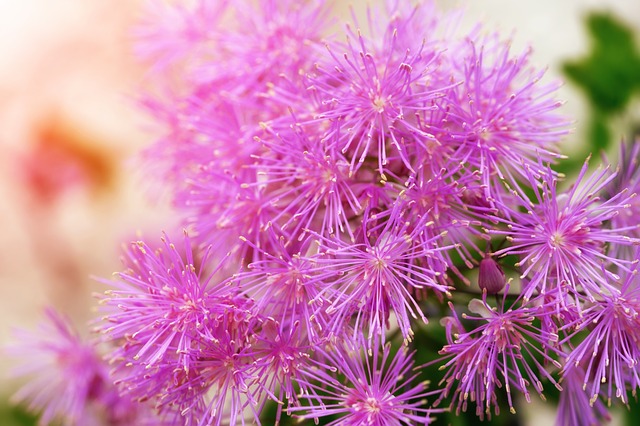 |  |  |   |   |
  |  |
Meadow-rue
are perennial perennial plants with a short and thick root, an upright stem 40-150 cm. The plants are glabrous. Leaves only on the stem, large, few, without leaflets, divided into two or three parts, on short petioles, expanded at the base.
The leaf plates are correct in outline, triangular, 10-30 cm long and wide. Inflorescences - various: pyramidal, cyme-shaped, bunch-shaped and also multi-flowered spikes. Flowers simple, regular, pink, yellowish, bright violet-lilac, white, small (<1cm in diameter). The fruit is a compound nut. Blooms in June-August.
The root and the surface part of the plant are used for medicinal purposes. The leaves and flowers are collected during the flowering of the plant (June-July), by cutting the leafy part of the plant (the upper side of the stem 30-35cm). Tie in small bundles and let dry, or spread a thin layer on drying nets, it is recommended to dry in natural, sun-protected and well-ventilated conditions. A dried drug retains its green color and consists of leafy stems with flowers and often fruits. The drug has a weak aroma and a bitter taste. Stored up to 2 years.
Roots are dug in autumn, September and October. Roots are stored in bags for no longer than 3 years. It is allowed to dry in forced dryers not exceeding 45C.
Meadow-rue
, like other plants of the gundegu family, contain poisonous alkaloids (berberine, talfetidine, talmin, talmidine, talicrine, etc.) and glycosides. Phytoncides, saponins, coumarins, tannins, flavonoids, phenolcarbonic acids (n-coumaric acid, sinapic acid, caffeic acid, ferulic acid), kaempferol, quercetin, essential oil, lithium are also found in the plant. In addition, there is also ascorbic acid in the leaves, steroids in the roots and vegetable fats in the fruits.
Medicinal significance
Meadow-rue
has a very broad spectrum of medicinal effects, it is bactericidal, anti-tumor, diuretic, choleretic, laxative, anti-inflammatory, wound-healing and tonic.
The plant accumulates lithium in itself, it is an element that plays a major role in the regulation processes of the nervous system. The alkaloids present in
Meadow-rue
have different effects, for example talmin has a depressing effect on the CNS, relaxes the smooth muscles, significantly reduces arterial blood pressure; berberine suppresses cell division and has a therapeutic effect in the treatment of leishmaniasis and malaria.
The alcohol extract of the plant has a pronounced vasodilating effect and lowers arterial blood pressure.
In folk medicine,
Meadow-rue
are used in ointments, decoctions, poultices, extracts, and in powder form to treat various ailments.
Meadow-rue
preparations act as anti-vomiting, anti-edema, strengthening and heart-supporting effects. It is used to treat diseases of the digestive tract, headaches, colds and other ailments.
Meadow-rue
preparations are effective in convulsions and neurosis, in epilepsy, indigestion and diarrhoea, in the treatment of stomach, liver and gall bladder diseases, as well as in stopping internal and external bleeding.
Meadow-rue
are widely used in cases of jaundice, ascites, edema, malaria, colds, dermatitis, rheumatism, pulmonary tuberculosis, headaches, disturbed metabolism.
In folk medicine,
Meadow-rue
is also used in gynecology, as a means to stop bleeding, as a diuretic and in case of nosebleeds.
Folk medicine recommends the use of
Meadow-rue, in the early stages of hypertension, as a hypotensive agent to widen blood vessels and lower arterial blood pressure, and it is also recommended to be used in cases of angina pectoris and circulatory disorders.
Externally, the setting of the
Meadow-rue
is used as a wound-healing and bleeding-stopping agent, it is used to treat wounds, ulcers, purulent wounds, skin rashes, etc. Compresses of a decoction of the plant help in cases of arthrosis and arthritis, regardless of their origin.
Local applications are made from fresh
Meadow-rue
to treat hernias, purulent wounds, bruises, panaritis, as well as reduce exacerbations of rheumatism.
